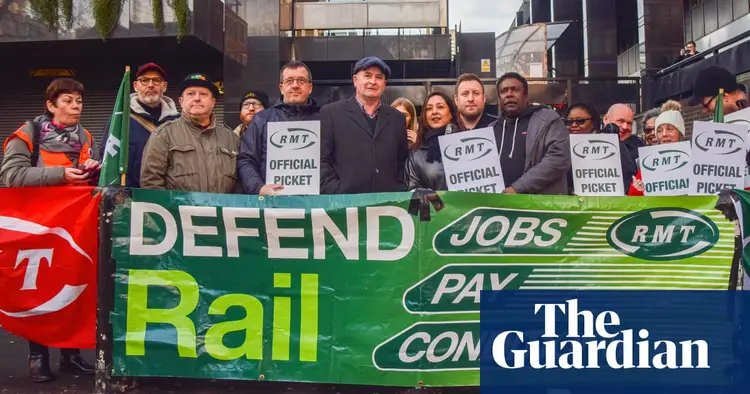RMT Accepts Network Rail Pay Offer, Ending Rail Strikes.

The RMT union's members have agreed to the wage proposal put forward by Network Rail.
In a recent referendum that ended on Monday, a vast number of railway employees, such as those operating signals, gave their consent to the proposal. The agreement entails a 9% raise spread over a two-year period, with a three-to-one vote in favour of it.
According to the union, almost 90% of its members participated in the vote and agreed to the offer with a 76% majority. The union has decided to settle its conflict with Network Rail.
This outcome brings an end to the highly disruptive strikes and gives reason to anticipate the resolution of all salary disagreements within the railway system. However, the RMT expressed that the responsibility for next steps lies with the government.
Workers belonging to the RMT union in 14 train companies are still prepared to initiate a strike on two separate days next week. The strike is scheduled to happen on March 30 and April 1. Meanwhile, employees who are members of the Aslef union have not reached a resolution for their dispute.
Nevertheless, the RMT's achievement at Network Rail, where the union that has instigated a majority of strikes holds the most power, is a significant development that the industry will embrace to resolve the most extensive labor disputes in decades.
Mick Lynch, the general secretary of RMT, stated that the union was originally informed in the start of 2022 that employees would only receive a small 2-3% increase in their pay. Nonetheless, with the help of strike action and the immense solidarity and resolve shown by union members, they were able to secure a better deal with increased funds. This new proposal has been heartily accepted by the union's members, effectively concluding the disagreement.
The disagreement with the train companies is still ongoing, and our members have recently shown their unwavering commitment to improving their situation with the 14 train companies through their successful strike action.
Should the train companies receive permission from the government to make a satisfactory offer, we will take that proposal to our members. However, until we receive such an offer, the planned strike on the 30th of March and 1st of April will still progress as scheduled. It is now up to the government to take action.
It's been reported that the Network Rail agreement will provide a boost of up to 15.2% for those at the bottom of the pay scale. As part of the improved offer, everyone's pay will rise by a minimum of £1,750 and there will also be some additional money paid out for past work. This comes after the original proposal was turned down in a vote that took place before the Christmas break.
The government officials have stated that the train operators have given their ultimate and top offer. Mark Harper, who is the transport secretary, expressed his contentment over the approval of the 5% with an additional 4% salary hike for two years, which the government put effort into facilitating, by the Network Rail's RMT members.
Although there is positive information to report, regrettably, RMT laborers who are affiliated with train operating firms are being excluded from the potential resolution. This unfortunate circumstance is due to RMT's rejection of the Rail Delivery Group's [RDG] nearly identical proposal, preventing these members from obtaining a fair increase in pay.
For this reason, I am repeating my call to the RMT to cancel their scheduled strikes that will affect train operating companies. Instead, I suggest they bring the Rail Delivery Group's offer to a vote and allow their members to determine the outcome.
Andrew Haines, who is the CEO of Network Rail, stated that he was delighted with the result of the RMT member vote on the offer. The outstanding majority of positive votes is great news for the workers, the commuters, and the country. The attention of him and his staff will now be focused on restoring the railway service to its former glory.
The RMT consists of a little more than 20,700 individuals who work at Network Rail. Among these individuals, 18,300 members who belong to various grades were able to vote in a referendum. These numbers represent less than half of the 42,000 network rail employees. Meanwhile, approximately 20,000 train operators and station workers remain in disagreement with the RMT, while only around 3,000 TSSA union members have approved the RDG pay offer as of last month.
Around 12,000 train drivers who are members of Aslef are currently in disagreement with national rail train operators that are contracted with the Department for Transport. Although they have carried out fewer strikes, they are capable of completely stopping services during these actions. Despite the fact that a permanent solution to the issue with Aslef is not expected soon, discussions are ongoing, and there are no more plans to strike at this moment.



















































